Supplements for Parents Facing Toddler Tantrums: Staying Calm When Little Emotions Run Wild
Introduction
Parenting a toddler is one of the most beautiful — and most stressful — experiences on the planet. One minute, you’re watching your little one giggle uncontrollably, and the next, they’re melting down in the grocery store because the banana broke in half.
Tantrums are developmentally normal. They’re how toddlers communicate when their brains are overwhelmed by emotion and their words can’t keep up. But for parents, those moments can test every ounce of patience and self-control.
It’s easy to feel guilty for losing your temper or exhausted by the constant need to stay calm. You’re not failing — your nervous system is simply under pressure. The good news? There are natural supplements that can support your body’s stress response, help balance your mood, and make it easier to stay patient through even the loudest meltdowns.
Let’s explore the biology of parental stress, why toddler tantrums hit so hard, and which nutrients can help you regulate your emotions and energy — so you can respond with love, not burnout 🌿💛.
Looking for supplements for This? Click here.
Why Toddler Tantrums Trigger Parents So Deeply 😤
When your child screams, kicks, or refuses to listen, your body reacts instinctively. The brain interprets loud cries or emotional chaos as potential danger, activating the fight-or-flight response.
Heart rate spikes, cortisol floods your bloodstream, and your amygdala (the brain’s alarm center) goes into overdrive. This makes it harder for your prefrontal cortex — the rational, patient part of your brain — to stay online.
That’s why even calm, loving parents sometimes yell or shut down in frustration. It’s not because you lack self-control — it’s because your nervous system is overwhelmed.
And the problem is compounded by chronic stress: sleep deprivation, endless multitasking, and emotional exhaustion. Over time, these factors deplete your brain’s neurotransmitters and nutrients that support calm focus — like magnesium, B vitamins, and omega-3s.
Rebuilding that biochemical foundation can make an enormous difference in how you respond when your toddler’s emotions explode.
Why Toddler Tantrums Trigger Parents So Deeply 😤

When your child screams, kicks, or refuses to listen, your body reacts instinctively. The brain interprets loud cries or emotional chaos as potential danger, activating the fight-or-flight response.
Heart rate spikes, cortisol floods your bloodstream, and your amygdala (the brain’s alarm center) goes into overdrive. This makes it harder for your prefrontal cortex — the rational, patient part of your brain — to stay online.
That’s why even calm, loving parents sometimes yell or shut down in frustration. It’s not because you lack self-control — it’s because your nervous system is overwhelmed.
And the problem is compounded by chronic stress: sleep deprivation, endless multitasking, and emotional exhaustion. Over time, these factors deplete your brain’s neurotransmitters and nutrients that support calm focus — like magnesium, B vitamins, and omega-3s.
Rebuilding that biochemical foundation can make an enormous difference in how you respond when your toddler’s emotions explode.
Magnesium: The Mineral of Patience 🌿
Magnesium is the first nutrient to think about when it comes to parental calm. It’s involved in over 300 enzymatic processes, many of which control the stress response.
When cortisol rises, magnesium levels drop. When magnesium drops, irritability and muscle tension increase — creating a loop of reactivity.
Supplementing with magnesium glycinate or magnesium threonate supports relaxation, steady mood, and better sleep. Parents who take magnesium often notice they can pause before reacting — they feel their anger rise but can breathe through it instead of snapping.
It’s also safe for daily use and can be taken with meals or in the evening for restorative sleep.
L-Theanine: Calm Without Fatigue 🍵
L-theanine, found naturally in green tea, is one of the most powerful compounds for stress resilience. It increases alpha brain waves, which promote a relaxed yet alert state — the mental clarity you need when a tantrum hits in public.
It works by balancing neurotransmitters like dopamine, serotonin, and GABA, creating calm focus without drowsiness.
Unlike caffeine or energy drinks, which spike stress hormones, L-theanine helps smooth out emotional ups and downs. A small dose (100–200 mg) in the morning can improve patience, reduce anxiety, and keep your mind steady when emotions run high.
B Vitamins: Emotional Energy and Stability ⚡
B vitamins are the building blocks for serotonin, dopamine, and norepinephrine — neurotransmitters that regulate mood, motivation, and energy.
Parenting stress burns through B vitamins quickly. Deficiency can lead to fatigue, irritability, and emotional volatility.
A balanced B-complex supplement can help stabilize your energy and mood throughout the day, reducing that “short fuse” feeling that can arise when you’re running on empty.
Vitamin B6, in particular, supports serotonin synthesis, while B12 enhances focus and energy without overstimulation.
Ashwagandha: The Adaptogen That Calms the Storm 🌾
Ashwagandha is an adaptogenic herb that helps the body adapt to chronic stress. It modulates cortisol, supports thyroid health, and promotes emotional stability.
For parents, it’s especially useful because it provides calm and energy — helping you stay composed during meltdowns without feeling sedated or sluggish.
Over time, ashwagandha can lower the intensity of the stress response, meaning fewer racing thoughts, less tension, and more grounded patience.
A typical daily dose is 300–600 mg of standardized extract, taken in the morning or with lunch.
Rhodiola Rosea: Energy Without Edginess 🌄
If you’re running on caffeine and adrenaline just to keep up with your toddler, Rhodiola rosea can help rebalance your system.
This adaptogen supports mitochondrial energy production, stabilizes dopamine and serotonin, and reduces the emotional crash that follows chronic stress.
It’s particularly helpful for parents who feel mentally drained, overwhelmed, or emotionally flat. Rhodiola enhances resilience — the ability to bounce back after a hard day without carrying the stress into tomorrow.
Omega-3 Fatty Acids: Emotional Fluidity 🐟
Omega-3s (EPA and DHA) strengthen the brain’s cell membranes, improving neurotransmitter function and emotional regulation.
Research shows omega-3 supplementation can reduce symptoms of irritability, anxiety, and low mood — common challenges for overwhelmed parents.
By improving communication between neurons, omega-3s create smoother thinking and greater emotional control. When your toddler starts screaming over the wrong color cup, your brain can access rational thought faster instead of spiraling into stress.
Aim for 1000–2000 mg of combined EPA and DHA daily.
GABA and L-Taurine: Natural Calming Compounds 🌙
GABA (gamma-aminobutyric acid) is your brain’s natural brake pedal — it slows overactive neural firing and promotes a sense of safety.
Low GABA levels are linked to anxiety and irritability. Supplementing with GABA or L-taurine (which supports GABA activity) can help you stay physically calm even when emotionally challenged.
They’re especially useful in moments of acute overwhelm — like bedtime battles or long car rides — when your body needs to come down from stress quickly.
Vitamin D: Mood and Resilience ☀️
Low vitamin D is strongly linked to low mood, fatigue, and irritability. Parents who spend long hours indoors or live in cloudy climates are especially at risk of deficiency.
Vitamin D supports serotonin production and immune regulation, both of which affect emotional well-being.
Getting sunlight daily is ideal, but supplementation (1000–4000 IU per day, depending on your levels) can help restore mental brightness and emotional steadiness.
Looking for supplements for This? Click here.
Chamomile and Lemon Balm: Nature’s Soothing Herbs 🌼
Sometimes, the simplest solutions are the most effective. Chamomile and lemon balm are gentle herbs that calm the nervous system, ease muscle tension, and promote rest.
A warm cup of chamomile tea after your toddler is finally asleep can do wonders for your mood and sleep quality. Lemon balm adds a refreshing lift while reducing anxiety.
These herbs can also be taken in capsule or tincture form for on-the-go calm.
The Role of Blood Sugar in Parental Patience 🍎
One of the most overlooked factors in emotional regulation is blood sugar stability.
When blood sugar drops, cortisol and adrenaline spike — mimicking a stress response. This is why skipped meals can make you snappy or impatient.
To stay calm through the day, combine complex carbs with protein and healthy fats at every meal. Keep snacks like nuts, boiled eggs, or fruit nearby to avoid the dreaded “hangry parent” syndrome.
A balanced diet enhances the effects of all calming supplements.
Mind–Body Practices That Amplify Calm 🌬️
Supplements are powerful, but they work best when combined with mind-body tools that regulate your nervous system in real time.
When your child’s meltdown begins, your instinct might be to fix it immediately — but your first job is to regulate yourself.
Try this technique:
Take a slow inhale through your nose for four seconds, hold briefly, and exhale slowly for six. Notice your shoulders drop and your heart rate slow.
You’re signaling to your brain: I’m safe. I can handle this.
Over time, this builds resilience. Pairing deep breathing with magnesium or L-theanine enhances both effects — biochemical calm meets mindful calm.
Emotional Awareness: The Hidden Superpower 💞
Staying calm with toddlers isn’t about perfection — it’s about awareness.
You’ll still have moments when you lose your cool. That’s okay. What matters is how quickly you repair — by apologizing, reconnecting, and modeling emotional honesty.
Supplements don’t erase emotion; they give your brain the bandwidth to choose patience over impulse.
When you nurture your nervous system, you’re not just helping yourself — you’re teaching your child how to self-regulate by example.
Building a Daily Calm Routine 🌿
Here’s what a calming supplement routine might look like for parents:
Morning: L-theanine + B-complex + omega-3s (for steady mood and focus)
Afternoon: Ashwagandha or rhodiola (for stress resilience)
Evening: Magnesium glycinate + chamomile tea (for relaxation and recovery)
This combination supports every layer of calm — mental, emotional, and physical.
Add in mindfulness breaks, hydration, and gentle exercise, and you’ll notice not just more patience, but more energy and joy in daily parenting moments.
When to Seek Extra Support ❤️
If you find yourself constantly overwhelmed, exhausted, or unable to regulate even with self-care, you might be experiencing chronic stress or burnout.
It’s important to talk with a healthcare provider or therapist, especially if you notice symptoms like insomnia, frequent anger, or emotional numbness.
Supplements support the brain’s chemistry, but therapy and emotional tools heal the deeper patterns — the expectations, guilt, and pressure parents often carry.
There’s no shame in needing support. You’re doing one of the hardest jobs in the world.
From Reactivity to Regulation 🌈
Parenting a toddler will always bring chaos, but chaos doesn’t have to equal stress.
When your brain and body are nourished, your patience expands. Your child feels safer. You start seeing tantrums not as battles to win, but as moments of connection — opportunities to teach emotional resilience by living it.
That’s the real magic of supplement-supported calm: it doesn’t just change your mood — it transforms the atmosphere of your home.
A calmer parent means a calmer child. And when both nervous systems feel safe, growth and love can flourish 💞.
Looking for online therapy ? Click Here.
References
Kennedy, D. O. (2016). “Cognitive nutrition and stress modulation.” Frontiers in Neuroscience, 10: 23.
Boyle, N. B., et al. (2017). “Magnesium and emotional regulation.” Nutrients, 9(5): 429.
Kimura, K., et al. (2007). “L-theanine and stress resilience.” Biological Psychology, 74(1): 39–45.
Panossian, A., & Wikman, G. (2010). “Adaptogens and neurochemical modulation.” Phytomedicine, 17(6): 481–493.
Hibbeln, J. R., et al. (2018). “Omega-3 fatty acids and emotional control.” Progress in Neuro-Psychopharmacology & Biological Psychiatry, 80: 109–117.
Lopresti, A. L., et al. (2019). “Ashwagandha and cortisol modulation.” Medicine (Baltimore), 98(37): e17186.
Benton, D. (2010). “B vitamins and stress response.” Nutrition Reviews, 68(10): 585–601.
Lanius, R. A., et al. (2018). The Neurobiology and Treatment of Stress and Regulation. Routledge.
McEwen, B. S. (2007). “Stress, brain function, and resilience.” Annals of the New York Academy of Sciences, 1113: 111–124.
Kiecolt-Glaser, J. K., et al. (2011). “Psychological stress, inflammation, and the benefits of omega-3 supplementation.” Brain, Behavior, and Immunity, 25(8): 1725–1734.
Related Posts
-
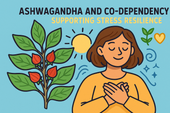
Ashwagandha and Co-Dependency: Supporting Stress Resilience
Stress is more than a feeling—it’s a full-body signal that your system is overwhelmed. When the mind races and the body tenses, your hormones, breathing, and focus all shift into survival mode. Chronic stress doesn’t just affect emotions—it reshapes your nervous system, drains your energy, and clouds your clarity. Learning to understand and manage stress gently is the first step toward peace, balance, and true recovery. 🌿💫
-

Why Co-Dependency Feels Draining: Adrenal Fatigue and Supplements That Help
The adrenal glands are small but powerful organs that sit above your kidneys, acting as your body’s built-in stress managers. They produce hormones like cortisol and adrenaline that help regulate energy, mood, and resilience. When they’re overworked from chronic stress or emotional exhaustion, fatigue and imbalance follow. Supporting adrenal health naturally can help restore calm, energy, and hormonal balance. 🌿⚡
-

The Link Between Anxiety, Co-Dependency, and Natural Support
Anxiety feels like living in constant alert mode—your heart races, your thoughts loop, and your body can’t find peace. It’s the nervous system’s way of preparing for danger, even when none exists. Understanding what’s happening in your mind and body is the first step toward calming the storm and restoring balance. 🌿💫
-

Supplements That Support Dopamine and Serotonin in Co-Dependent Patterns
Serotonin is the neurotransmitter of calm, confidence, and contentment. When it’s balanced, you feel peaceful and emotionally grounded. When it’s low, anxiety, mood swings, and emotional dependence take over. By understanding serotonin’s role in emotional health—and how to support it naturally—you can rebuild inner stability, improve relationships, and cultivate lasting happiness from within. 🌞💫
-

How Emotional Exhaustion in Codependency Impacts the Nervous System
The nervous system is the body’s communication network, connecting the brain to every organ and muscle. It regulates stress, mood, and emotion through a delicate balance of electrical and chemical signals. When overwhelmed, it can become dysregulated—leading to fatigue, anxiety, and emotional imbalance. Understanding how to calm and strengthen the nervous system is key to healing from chronic stress and emotional burnout. ⚡🌿
-

What Is Co-Dependency? The Role of Brain Chemistry and Stress
Stress is more than a feeling—it’s a full-body experience that begins in the brain and ripples through every cell. When cortisol surges and the nervous system stays on alert, your body can’t rest or recover. Over time, this constant tension affects energy, focus, mood, and even immune health. Understanding stress chemistry is the first step toward breaking free from burnout and finding calm again. 🌿
-

Creating a Supplement Stack for Motivation, Energy, and Anti-Procrastination
Motivation is the fuel behind every meaningful achievement—but it’s not just about willpower. It’s a mix of mindset, brain chemistry, and momentum. When energy, focus, and purpose align, action feels natural instead of forced. Learn how to harness motivation as a daily state, not a fleeting feeling.
-

Supplements for Building Consistency and Reducing Chronic Procrastination
Biochemistry is the bridge between biology and chemistry—the science of life at the molecular level. It explains how nutrients, hormones, and neurotransmitters interact to create energy, thought, and emotion. From brain function to muscle movement, biochemistry reveals the invisible processes that sustain health, balance, and vitality.
-

GABA and Procrastination: Supporting Calm Focus for Productivity
GABA is the brain’s natural calming messenger—a neurotransmitter that helps slow mental overactivity and ease stress. When GABA levels drop, focus fades, anxiety rises, and procrastination becomes more likely. By supporting GABA through nutrition, lifestyle, and supplements, you can restore calm clarity, improve focus, and take action with steady, balanced energy.
-

Ashwagandha and Procrastination: Lowering Stress to Improve Action
Science is the language of curiosity and discovery. It helps us understand the hidden patterns behind life, energy, and the universe. Through experimentation and critical thinking, science connects imagination to evidence—turning questions into knowledge. Whether through microscopes, molecules, or minds at work, science represents our endless pursuit of truth and innovation.
-

Neurotransmitters and Motivation: Supplements That Support Drive and Focus
Supplements can do more than boost physical health—they can also enhance mental clarity, focus, and motivation. Nutrients like omega-3s, magnesium, B vitamins, and adaptogens help balance neurotransmitters, stabilize mood, and support brain energy. When combined with good sleep, nutrition, and mindful habits, they can transform how your brain performs under stress.
-

How Stress Hormones Like Cortisol Fuel Procrastination (and What Helps)
Blood sugar isn’t just about physical health—it directly impacts focus, mood, and motivation. When glucose levels spike and crash, energy and attention do the same, fueling procrastination and brain fog. Learning how to stabilize blood sugar through balanced meals, mindful habits, and key nutrients helps keep your mind steady, focused, and ready to act.
-

Brain Fog and Procrastination: Supplements for Mental Clarity
Brain fog can turn even simple tasks into mental hurdles. When your thoughts feel slow and unclear, procrastination often follows—making focus and productivity seem impossible. This article explores the biochemical and lifestyle causes of brain fog and reveals the most effective supplements for restoring mental clarity, focus, and sustained energy.
-

The Link Between Low Energy and Procrastination: Can Supplements Help?
Neurochemistry shapes how we think, feel, and act. When neurotransmitters like dopamine, serotonin, and GABA fall out of balance, it can lead to fatigue, anxiety, or lack of motivation—fueling procrastination and low mood. Understanding the brain’s chemical communication system helps us find ways to restore focus, calm, and emotional stability through nutrition, mindfulness, and targeted supplements.
-

Why Do We Procrastinate? The Role of Dopamine and Supplements That Support It
Dopamine is the brain’s motivation messenger—the chemical that fuels focus, reward, and drive. When dopamine levels drop, even simple tasks can feel impossible to start. This article explores how dopamine shapes procrastination, motivation, and mental energy, along with natural supplements and daily habits that help restore balance and get things done.
-

Phosphatidylserine and Stress Reduction for People with BDD
Stress is more than a mental state—it’s a full-body experience that affects hormones, brain chemistry, and emotional balance. For people with Body Dysmorphic Disorder (BDD), constant tension and worry about appearance can overload the nervous system. Learning how stress works and finding ways to calm it is key to breaking the cycle of anxiety and self-criticism.
-

How Antioxidants Like Vitamin C & E Support Mental Health in BDD
Antioxidants are the body’s natural defense against stress and inflammation. For people with Body Dysmorphic Disorder (BDD), oxidative stress can worsen fatigue, anxiety, and emotional imbalance. Nutrients like Vitamin C and E help protect brain cells, boost neurotransmitter function, and support a calmer, clearer mindset—building a stronger foundation for recovery.
-

Ginkgo Biloba and Memory Support for BDD Recovery
Emotional regulation is the foundation of healing from Body Dysmorphic Disorder (BDD). When the nervous system stays in constant overdrive, even small stressors can trigger self-critical spirals. Learning to calm emotional reactivity helps restore clarity, confidence, and a sense of inner balance. By blending mindfulness, nervous system support, and self-compassion, you can retrain your brain to respond—not react—to emotion.
-

Alpha GPC and Cognitive Function in Body Dysmorphic Disorder
Mental fatigue can feel like your brain has hit a wall—thoughts slow down, focus fades, and motivation disappears. For people with Body Dysmorphic Disorder (BDD), chronic overthinking, emotional stress, and constant self-evaluation can deplete mental energy even further. Understanding what causes this cognitive exhaustion is the first step toward recovery—through rest, balanced nutrition, and targeted brain-supporting supplements.
-

N-Acetyl L-Tyrosine and BDD: Supporting Mental Clarity
Chronic stress doesn’t just affect your mood—it reshapes your brain chemistry, weakens focus, and fuels the obsessive thought loops common in Body Dysmorphic Disorder (BDD). Over time, constant cortisol elevation drains mental energy and emotional balance. Learning to recognize and manage chronic stress is essential to restoring mental clarity, self-compassion, and resilience.
-

Chamomile and Lavender for Calming Obsessive Body Image Thoughts
The nervous system is the command center of our emotional and physical world—and in Body Dysmorphic Disorder (BDD), it often operates in overdrive. Understanding how the brain and body communicate under stress reveals why intrusive thoughts feel uncontrollable. Learning to regulate the nervous system through calm practices, nutrition, and supplements helps restore inner balance and emotional safety.
-

Adaptogens for Body Dysmorphic Disorder: Rhodiola, Ginseng, and More
Rhodiola rosea, often called the “golden root,” is an adaptogenic herb renowned for boosting stress resilience and mental endurance. For individuals with Body Dysmorphic Disorder (BDD), Rhodiola may help reduce fatigue, regulate cortisol, and enhance emotional balance. By supporting both mind and body, this powerful plant promotes calm focus, improved mood, and renewed energy to face daily challenges.
-

B Vitamins for Stress Resilience in BDD: Rebuilding Calm from Within
Biochemistry is at the heart of every thought, emotion, and reaction we experience. In Body Dysmorphic Disorder (BDD), chemical imbalances in neurotransmitters like serotonin, dopamine, and GABA can amplify stress and distort self-perception. Understanding the biochemistry behind mood and stress regulation offers a path toward healing—bridging the gap between emotional experience and the body’s molecular balance.
-

Melatonin and Body Dysmorphic Disorder: Restoring Healthy Sleep Patterns
Melatonin, the body’s natural sleep hormone, plays a vital role in helping people with Body Dysmorphic Disorder (BDD) restore healthy sleep cycles. When anxiety and obsessive thinking interfere with rest, melatonin levels often drop, leading to more emotional reactivity and distorted self-perception. This article explores how melatonin works, why BDD disrupts it, and how natural supplementation—combined with mindful routines—can help the brain and body finally find calm at night.
-

Sleep Struggles with BDD: Supplements for Rest and Recovery
When you’re living with Body Dysmorphic Disorder (BDD), restful sleep can feel impossible—but the right supplements can help reset your body’s natural rhythm. From magnesium and L-theanine to 5-HTP and ashwagandha, these nutrients support relaxation, lower cortisol, and enhance melatonin production. This article explores how supplements can calm the mind, ease nighttime anxiety, and promote true restorative sleep for emotional and physical recovery.
-

5-HTP and Serotonin Balance: Could It Help with Body Dysmorphic Disorder?
Anxiety can feel like a storm inside the mind—restless, overwhelming, and hard to control. In people with Body Dysmorphic Disorder (BDD), anxiety often fuels obsessive thoughts and self-criticism, creating a painful cycle of worry and self-doubt. This article explores the biological roots of anxiety, the role of neurotransmitters like serotonin and GABA, and how natural strategies such as mindfulness, supplements, and nervous system regulation can restore calm and mental clarity.
-

Can Ashwagandha Help Ease Stress and Anxiety in Body Dysmorphic Disorder?
Neurotransmitters like serotonin, dopamine, GABA, and acetylcholine are the chemical messengers that shape how we think, feel, and react to stress. In Body Dysmorphic Disorder (BDD), imbalances in these neurotransmitters can amplify anxiety, obsessive thinking, and emotional distress. This article explores how restoring healthy brain chemistry through nutrition, supplements, and mindfulness can help bring clarity, calm, and emotional stability.
-

L-Theanine for BDD: Finding Calm in the Mind
Neurochemistry plays a central role in how we think, feel, and see ourselves. For those living with Body Dysmorphic Disorder (BDD), imbalances in neurotransmitters like serotonin, dopamine, and GABA can intensify anxiety, obsessive thoughts, and emotional distress. This article explores how regulating brain chemistry through supplements, mindfulness, and lifestyle changes can bring the nervous system back into harmony and restore inner calm.
-

Omega-3 Fatty Acids and Body Image Disorders: Supporting Emotional Health
Omega-3 fatty acids do far more than support heart health—they nourish the brain, stabilize mood, and may ease the emotional turbulence tied to body image disorders like BDD. This in-depth article explores how omega-3s regulate serotonin, dopamine, and inflammation, helping individuals reduce obsessive thoughts and rebuild self-acceptance. It also connects nutrition to therapy, mindfulness, and nervous system balance for holistic emotional healing.
-

Magnesium and BDD: Calming an Overactive Nervous System
Magnesium plays a crucial role in calming an overactive nervous system—something people with Body Dysmorphic Disorder (BDD) struggle with daily. This article explores how magnesium supports relaxation, emotional regulation, and stress reduction while diving into the science behind its connection to brain chemistry. It also examines how combining magnesium supplementation with therapy and breathwork can help rebalance the body’s stress response, reduce obsessive thought patterns, and promote lasting nervous system calm.
-

The Gut-Brain Axis and BDD: Why Probiotics Might Matter
The gut and brain are constantly in conversation — and that dialogue may shape how you experience Body Dysmorphic Disorder. By nurturing your microbiome with probiotics, prebiotics, and gut-healing nutrients, you can help rebalance serotonin, calm anxiety, and restore emotional stability from within 🧠🦠.
-
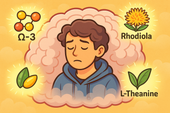
Brain Fog and Body Dysmorphic Disorder: Can Nootropic Supplements Help?
Brain fog often accompanies Body Dysmorphic Disorder, clouding focus and deepening emotional fatigue. Nootropic supplements like L-theanine, Rhodiola, and CoQ10 can help restore mental clarity, balance neurotransmitters, and bring calm energy back to the mind 🌿🧠.
-

How Stress Hormones Like Cortisol May Worsen Body Dysmorphic Disorder
Chronic stress floods the brain with cortisol — the hormone that keeps you on high alert. In Body Dysmorphic Disorder, this chemical overdrive fuels anxiety, distorts self-image, and traps the body in survival mode. Calming cortisol helps restore both peace and perspective 🌿🧠.
-

The Role of Neurotransmitters in BDD—and How Supplements May Help
Neurotransmitters like serotonin, dopamine, glutamate, and GABA shape how people with Body Dysmorphic Disorder perceive themselves. When these brain messengers fall out of balance, perception distorts — but targeted supplements can help restore calm, focus, and emotional regulation 🧠🌿.
-

What Is Body Dysmorphic Disorder? A Deeper Look at the Mind-Body Connection
Body Dysmorphic Disorder (BDD) isn’t just about appearance — it’s about perception. When brain chemistry, trauma, and stress distort self-image, the mind begins to see flaws that aren’t truly there. Healing starts by calming the nervous system and reconnecting mind and body 🪞🧠.
-

Keeping Calm in Competitive Sports: How to Train Your Mind, Body, and Chemistry for Peak Performance
Competitive pressure can overwhelm even the strongest athletes — but calm is trainable. By combining supplements like magnesium, L-theanine, and adaptogens with breathwork and mindset training, you can stay focused, balanced, and in control under any level of stress 🧠🏅.
-

Workplace Stress and Anger Management Support
Workplace stress can quickly turn into frustration — but calm is a skill you can train. By combining supplements like magnesium, L-theanine, and adaptogens with breathwork and mindset tools, you can stay focused, patient, and emotionally grounded no matter how intense the office gets 💼🌿.
-

How to Stay Patient With Family During Stressful Holidays
Holiday gatherings can stir up old stress and test your patience — but calm is possible. With nervous system support from magnesium, L-theanine, and adaptogens, plus mindful breathing and clear boundaries, you can stay centered, kind, and grounded even when family chaos unfolds 🎄💞.
-

Supplements to Keep Calm During Traffic Jams
Getting stuck in traffic doesn’t have to ruin your mood. With calming supplements like magnesium, L-theanine, and ashwagandha, you can train your body to stay relaxed and focused behind the wheel — turning gridlock into a moment of grounded patience 🚗🌿.
-
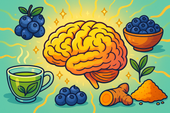
The Role of Antioxidants in Healing Brain Stress from Dissociation
Antioxidants protect the brain from the oxidative stress caused by trauma and dissociation. By neutralizing free radicals and supporting mitochondrial recovery, they help restore clarity, focus, and emotional balance — allowing the mind to heal at the cellular level 🌿🧠.
-
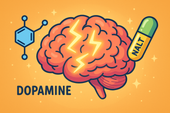
N-Acetyl L-Tyrosine (NALT) for Supporting Mental Clarity
N-Acetyl L-Tyrosine (NALT) fuels dopamine production — the neurotransmitter of focus and motivation. By supporting brain chemistry during stress, NALT helps restore mental clarity, energy, and alertness, making it easier to think clearly and feel present again ⚡🧠.
-

How Ginseng May Improve Focus and Energy in Dissociation
Ginseng helps combat the mental fatigue and fog that often come with dissociation. By supporting mitochondrial energy, balancing neurotransmitters, and regulating cortisol, it gently restores focus, motivation, and emotional presence — helping the mind reconnect with clarity and strength 🌿⚡.
-
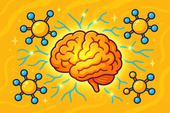
Phosphatidylserine and Dissociation: Supporting Cognitive Function
Phosphatidylserine helps calm the stress response by balancing cortisol, the body’s primary stress hormone. By lowering cortisol spikes, it protects memory, focus, and emotional stability — restoring clarity and mental presence for those struggling with dissociation 🧠🌿.
-
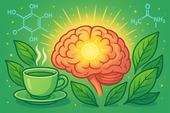
Can Green Tea Extract Help with Dissociative Brain Fog?
Green tea extract may help lift dissociative brain fog by supporting neurotransmitter balance, reducing inflammation, and enhancing energy at the cellular level. With its key compounds EGCG and L-theanine, it promotes calm focus, clarity, and emotional presence — helping you feel more alert and grounded 🍵🧠.
-
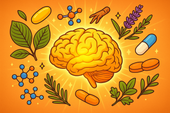
Building a Natural Supplement Stack for Dissociation Support
Building a supplement stack for dissociation means nourishing the brain and body back into communication. By supporting neurotransmitters, gut health, and energy balance through nutrients like magnesium, omega-3s, curcumin, and probiotics, you can help restore clarity, calm, and connection — one layer at a time 🌿🧠.
-

Chamomile and Lavender for Dissociative Anxiety Relief
Chamomile and lavender work together to calm dissociative anxiety by soothing the nervous system and restoring emotional safety. Their natural compounds balance cortisol, enhance GABA activity, and activate the vagus nerve — helping you feel grounded, connected, and at peace again 🌿💜.
-
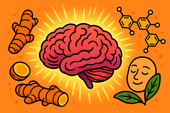
Curcumin for Inflammation and Mental Clarity in Dissociation
Curcumin, the golden compound in turmeric, does more than fight inflammation — it helps clear the mental fog often tied to dissociation. By calming neuroinflammation, balancing neurotransmitters, and supporting mitochondrial energy, curcumin can restore mental clarity, focus, and emotional presence 🌿🧠.
-
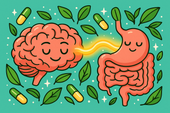
Probiotics and Dissociation: Exploring the Gut–Brain Axis
The gut–brain axis plays a vital role in emotional awareness and presence. When the microbiome is balanced, it supports serotonin production, vagus nerve activity, and calm focus. Probiotics help repair this connection — restoring safety, clarity, and the feeling of truly being in your body again 🌿🧠.
-
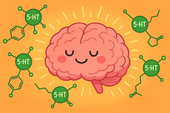
5-HTP for Dissociation: Supporting Serotonin and Emotional Stability
5-HTP helps bridge the gap between emotional numbness and stability by supporting serotonin production — the neurotransmitter that shapes mood, sleep, and sensory awareness. For people experiencing dissociation, 5-HTP may gently restore connection, presence, and emotional balance from the inside out 🌿🧠.

















































